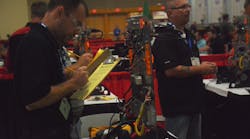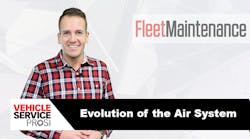The skills required to properly and efficiently service commercial vehicles have changed significantly in the last two decades, dictated by changes in vehicle technology. George Arrants, medium/heavy duty truck alliance manager for the ASE Education Foundation, has been the chair for the TMCSuperTech Technician Skills Competition for the last 14 years. He has witnessed the evolution of vehicle technology, and subsequently, how technicians service these vehicles, first-hand.
Transcription of interview:
David Brierley, Fleet Maintenance: Welcome to VSP News: Uptime Update. I am your host David Brierley, managing editor of Fleet Maintenance magazine, covering all maintenance, all vehicle classes, all management, all the time.
I’m filling in this week for Erica Schueller while she’s away attending a professional training program to earn her Class A commercial driver’s license.
The skills required to properly and efficiently service commercial vehicles have changed significantly in the last two decades, dictated by changes in vehicle technology.
The Technology & Maintenance Council, or TMC, hosts an annual technician skills competition to gauge the skills of future and current technicians each year. George Arrants, medium/heavy duty truck alliance manager for the ASE Education Foundation, has been the chair for the TMCSuperTech Technician Skills Competition for the last 14 years. He has witnessed the evolution of vehicle technology, and subsequently, how technicians service these vehicles, first-hand.
We first talked with him about the training and skills requirements necessary to work on more complex vehicles.
George Arrants, ASE Education Foundation: Fifteen years ago, a truck was a mechanical device. He had a battery, cables and some wires to light the vehicle. Now, it is an electronic nightmare. With all the systems on, and all the computers and processors, with most of this information leaving the truck and going to a central processing unit, the skills that a technician needs today are more electronic- or information-based, than they are on the mechanical side.
Brierley, Fleet Maintenance: Arrants notes some recent trends when it comes to servicing commercial vehicles.
Arrants, ASE: Aftertreatment is a big one. Everybody is dealing with the aftertreatment issues. Now, we’re starting to learn that many of the aftertreatment issues are not at the aftertreatment system. It’s downstream or upstream, and it’s other systems that are causing these problems.
Also, we’re also doing CAN communication. We’re sending information through electrical wires and we have to be able to understand what that information is, where it’s going, and if it’s being received correctly.
Brierley, Fleet Maintenance: The TMCSuperTech technician skills competition is a barometer for the ongoing skills required of techs.
What role does TMC play in helping to fulfill the training and skills needs of the commercial vehicle technician workforce? Arrants share more.
Arrants, ASE: TMC plays an important role. By having the TMCSuperTech Technician Skills competition, we’re asking technicians and future technicians to demonstrate the skills that they do every day on the job. But, we’re asking them to do it utilizing manufacturer’s recommended procedures and/or TMCs Recommended Practices (RPs).
We’re not asking them to just go out and fix the truck. We’re making sure they use the processes and procedures to get to the root cause and to find the answer to the vehicle is repaired right the first time.
What we’re able to learn is where there are possible disconnects in the technicians’ understanding of those processes, then modifying our training to correct those habits.
Brierley, Fleet Maintenance: While training will continue to address the complex changes in vehicles, there is still more to come. Arrants talks about what we can expect in the future.
Arrants, ASE: Five and ten years and beyond are going to be crazy for our industry – autonomous vehicles, electric vehicles, hydrogen-fueled vehicles. But the trucks that we have today, they are communication centers with wheels.
The skills that we’re going to need are technicians that can be able to use equipment that we’re currently not using to interpret and understand that information and make the proper repairs or adjustments in potential software to keep the trucks rolling.
Brierley, Fleet Maintenance: Interested to read more about the evolution of TMC’s Technician Skills competition, and the evolution of what technicians have needed to learn throughout the years? Then check out the link below.
Thank you for tuning in to VSP News Uptime Update, I’m your host David Brierley.
Until our next broadcast, keep up with this, and other industry topics, by visiting us online at VehicleServicePros.com.
Learn more about the evolution of TMC's Technician Skills Competition.


